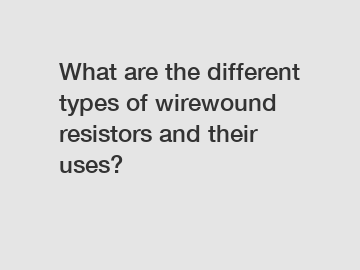What are the different types of wirewound resistors and their uses?
Wirewound resistors are common electronic components that are widely used in various electronic devices and circuits. They provide precise and stable resistance values, making them suitable for applications where accuracy and stability are crucial. In this article, we will explore the different types of wirewound resistors and their specific uses.
There are several types of wirewound resistors available in the market, each with its own unique characteristics and applications. The most common types include precision wirewound resistors, power wirewound resistors, and high-temperature wirewound resistors.
Precision wirewound resistors are designed to provide highly accurate resistance values with low tolerance and low temperature coefficient. They are commonly used in precision measurement equipment, such as multimeters and calibrators, where precise resistance values are required. The construction of precision wirewound resistors involves winding a resistive wire (usually made of nickel-chrome or manganese-copper alloy) on a ceramic or fiberglass core, ensuring excellent stability and accuracy.

On the other hand, power wirewound resistors are designed to handle high power dissipation. They are commonly used in power supply circuits, amplifiers, and motor control circuits. Power wirewound resistors have a robust construction, typically using a ceramic core and a high-wattage resistive wire. This construction allows them to withstand high temperatures and dissipate large amounts of power without significant resistance drift.
For applications that involve high temperatures, such as automotive and aerospace industries, high-temperature wirewound resistors are utilized. These resistors are designed to withstand extreme temperature variations without affecting their resistance values. They are typically made using materials with high-temperature coefficients of resistance, such as nickel-chrome alloys or graphite. High-temperature wirewound resistors find applications in engine control systems, aerospace electronics, and industrial automation.
The uses of wirewound resistors are vast and varied. They are essential components in electronic equipment that require accuracy, stability, and power dissipation capabilities. The diverse types of wirewound resistors enable engineers and designers to select the most suitable resistor for specific applications.
In conclusion, wirewound resistors come in various types, including precision, power, and high-temperature resistors. Each type serves a specific purpose and finds applications in different industries. The precision wirewound resistors offer high accuracy and stability for precision measurement equipment, while power wirewound resistors handle high power dissipation in power supplies and amplifiers. High-temperature wirewound resistors are designed for applications involving extreme temperatures. The availability of these different types of wirewound resistors provides engineers with options to meet the specific requirements of their electronic designs.
Want more information on Power Resistors Wholesale, glass glaze resistor, all types of resistors? Feel free to contact us.


